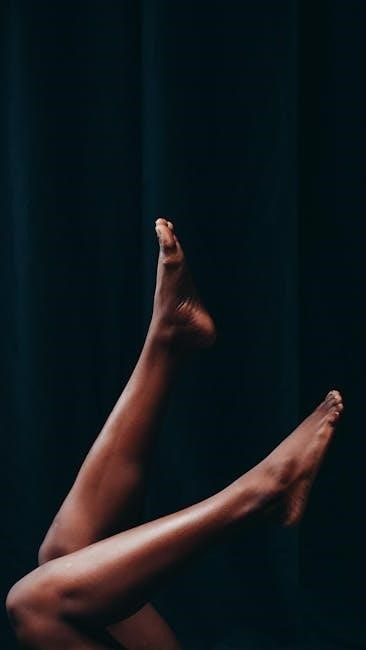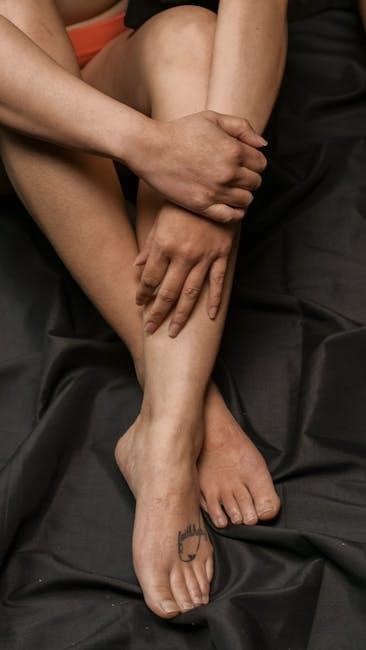Black Feminist Thought emerges from African-American women’s experiences, emphasizing the intersectionality of racism and sexism. It challenges dominant narratives, advocating for liberation and valuing Black women’s lives as a critical framework for social justice and empowerment.
1.1 The Philosophy of Black Feminism
Black Feminism is rooted in the belief that Black women’s experiences are central to understanding oppression. Patricia Hill Collins’ work emphasizes the social construction of Black Feminist Thought, highlighting the importance of self-definition and collective empowerment. This philosophy asserts that Black women’s lives are inherently valuable and that their liberation is essential. It challenges dominant narratives by addressing the intersectionality of racism and sexism, advocating for a world where Black women can thrive. The Black Feminist Guide to the Human Body, by Lisa B. Thompson, reflects this philosophy by addressing aging, respect, and beauty standards, celebrating resilience. It serves as a powerful tool for empowerment, fostering self-determination and honoring the unique contributions of Black women to social justice.
1.2 Intersectionality of Racism and Sexism
Black Feminist Thought highlights the intersectionality of racism and sexism, revealing how Black women face unique oppressions that cannot be separated. This concept, central to the philosophy, addresses the overlapping systems of discrimination that shape their experiences. The Black Feminist Guide to the Human Body emphasizes how these intersections manifest in daily life, from microaggressions to systemic inequalities. By addressing these dual oppressions, Black feminism provides a framework for understanding and challenging the ways racism and sexism collectively impact Black women’s bodies, identities, and opportunities. This lens is essential for advocating for justice and equality, ensuring that Black women’s voices and struggles are centered in broader social justice movements.
Physical Health and Wellness
Physical health and wellness are vital for Black women, addressing nutrition, body awareness, and fitness. These practices foster empowerment and holistic well-being, central to Black Feminist Thought.
2.1 Nutrition and Body Awareness
Nutrition and body awareness are central to Black women’s health, emphasizing the importance of nourishing both body and soul. By prioritizing whole foods and mindful eating, Black women can reclaim their relationship with their bodies, fostering self-love and resilience. This approach challenges societal beauty standards and promotes holistic well-being, aligning with Black Feminist Thought principles that value Black women’s lives and experiences. Proper nutrition not only improves physical health but also empowers individuals to take control of their overall wellness, creating a foundation for strength and vitality. This mindful approach to eating and body care is a powerful act of self-care and liberation.
2.2 Fitness and Movement for Black Women
Fitness and movement play a vital role in the holistic well-being of Black women, serving as a form of empowerment and self-care. Engaging in physical activities that honor Black cultural traditions, such as dance, can foster a deeper connection to one’s body and heritage. Movement is not just about physical health; it is also a way to resist societal norms and reclaim agency over one’s body. By embracing exercises that celebrate strength and resilience, Black women can challenge stereotypes and build confidence. Fitness becomes a form of resistance, promoting mental and emotional liberation while nurturing physical health. This approach to movement aligns with Black Feminist Thought, emphasizing the importance of self-love and collective empowerment.
2.3 Sexual Health and Reproductive Rights
Sexual health and reproductive rights are central to the empowerment of Black women, addressing historical injustices and modern disparities. Black Feminist Thought highlights the necessity of autonomy over one’s body, challenging systemic controls and biases. Advocacy efforts focus on dismantling barriers to healthcare access, ensuring comprehensive education, and promoting safe, equitable reproductive choices. Historical abuses, such as forced sterilization, underscore the urgency of safeguarding these rights. Modern movements emphasize the importance of culturally competent care and community-driven solutions. By prioritizing sexual health and reproductive freedom, Black women reclaim their agency, fostering resilience and liberation. This framework aligns with broader Black Feminist principles of justice, equity, and bodily sovereignty, ensuring that Black women’s voices and needs remain at the forefront of these critical issues.

Emotional and Mental Well-Being
Black women’s emotional well-being is shaped by resilience, self-care, and community support. Addressing microaggressions and fostering mental healing are vital for their holistic health and empowerment.
3.1 The Impact of Microaggressions
Microaggressions are subtle, everyday expressions of bias that significantly impact Black women’s emotional well-being. These gestures, often racially or sexually charged, can lead to feelings of invisibility, exclusion, and worthlessness. Research highlights how microaggressions contribute to mental health challenges, such as anxiety and low self-esteem, by constantly reminding Black women of systemic inequalities. Patricia Hill Collins’ work underscores how these experiences are deeply intertwined with the intersectionality of race and gender, creating unique emotional burdens. Addressing these microaggressions requires both individual and collective efforts to challenge these biases and foster a supportive environment. Black feminist thought emphasizes the importance of acknowledging and dismantling these subtle yet pervasive forms of oppression to promote healing and empowerment.
3.2 Body Image and Self-Esteem
Black women often face unique challenges regarding body image and self-esteem, shaped by societal beauty standards that frequently marginalize African features. The pressure to conform to Eurocentric ideals can lead to internalized racism and self-doubt. Patricia Hill Collins’ work highlights how these experiences are deeply intertwined with intersectionality, creating unique emotional burdens. Feminist-identified women, particularly Black women, report higher body satisfaction, suggesting that embracing feminist principles can foster resilience. However, societal pressures still undermine self-esteem, emphasizing the need for collective support and empowerment. Addressing these issues requires a shift in cultural narratives, promoting diverse representations and challenging harmful stereotypes. By fostering a positive and inclusive environment, Black women can reclaim their beauty and worth, fostering a healthier sense of self and identity.
3.3 Mental Health Resources for Black Women
Mental health resources tailored to Black women’s unique experiences are crucial, given the intersectional challenges they face. Patricia Hill Collins’ work emphasizes the importance of addressing these issues through a Black feminist lens. Programs like the National Black Women’s Health Project and digital platforms offering culturally sensitive care are vital. Community-based initiatives and advocacy groups play a significant role in providing accessible support. Black feminist leaders are at the forefront of promoting mental health awareness, challenging systemic barriers, and fostering resilience. By amplifying these resources and creating safe spaces, Black women can find healing and empowerment, ensuring their well-being is prioritized and supported within their communities and beyond.

Societal Challenges and Beauty Standards
Black women face societal pressures to conform to Eurocentric beauty ideals, often leading to internalized racism and self-esteem struggles. Challenging these norms is essential for empowerment and self-acceptance.
4.1 The Pressure of Beauty Standards
The pressure to conform to Eurocentric beauty ideals weighs heavily on Black women, often perpetuating internalized racism and self-doubt. Societal beauty standards, deeply rooted in historical racism and sexism, frequently marginalize Black women’s natural features, such as hair texture and skin tone. These ideals are reinforced through media, advertising, and cultural narratives, creating a false notion of beauty that excludes and devalues Black women. The Black Feminist Guide emphasizes the importance of challenging these harmful standards, advocating for self-love and acceptance. By reclaiming and celebrating their natural beauty, Black women can resist societal pressures and embrace their unique identities. This resistance is a powerful act of self-liberation and empowerment.
4.2 Aging and Respect for Black Women
Aging Black women often face a double burden of racism and ageism, which can diminish their visibility and respect in society. The Black Feminist Guide highlights the need to challenge these biases, emphasizing the value of Black women’s wisdom and contributions across all life stages. Aging is not merely a biological process but a journey marked by resilience and strength. Black women deserve to be honored for their life experiences and the wisdom they impart. By fostering intergenerational connections and valuing elders, communities can create spaces where aging Black women are celebrated. This shift in perspective is essential for dismantling ageist and racist narratives that erase their presence and contributions.
4.3 Combating Stereotypes and Bias
Combating stereotypes and bias is crucial for Black women’s empowerment. The Black Feminist Guide emphasizes challenging harmful narratives that perpetuate racism and sexism. Media representation often reduces Black women to simplistic, dehumanizing tropes, erasing their complexity. Microaggressions, subtle expressions of bias, further marginalize them. These injustices impact mental health and self-esteem, reinforcing systemic inequality. To combat this, education and awareness are vital. Amplifying Black feminist voices and promoting diverse representation can dismantle stereotypes. Community support and advocacy play a key role in fostering resilience. By challenging biases and advocating for equitable treatment, society can move toward inclusivity and respect. This fight is not just individual but collective, requiring systemic change to honor Black women’s humanity and contributions.

Reproductive Justice and Rights
Black feminist thought addresses historical injustices like involuntary sterilization and advocates for reproductive freedom. It emphasizes bodily autonomy, challenging systemic control over Black women’s reproductive choices and rights.
5.1 Historical Context of Reproductive Control
The historical context of reproductive control for Black women is rooted in systemic oppression, including forced sterilization and coerced birth control. These practices stemmed from racist and sexist ideologies aimed at controlling Black populations. During slavery, enslaved women’s bodies were exploited for labor and reproduction, with no autonomy over their own health. In the 20th century, involuntary sterilizations, often through state-sanctioned eugenics programs, targeted Black women. These injustices have led to ongoing mistrust in medical systems and a fight for reproductive justice. Black feminist thought highlights these histories to underscore the importance of bodily autonomy and the right to make informed decisions about one’s own health and future.
5.2 Modern Advocacy for Reproductive Freedom
Modern advocacy for reproductive freedom centers on ensuring Black women’s autonomy over their bodies and health. Grassroots movements and organizations emphasize access to equitable healthcare, challenging systemic barriers. Leaders in this space highlight the importance of intersectionality, addressing how race, gender, and class intersect to impact reproductive rights. Efforts include policy advocacy, community education, and amplifying marginalized voices. This work builds on historical struggles, seeking to dismantle oppressive systems and empower Black women to make informed decisions about their bodies. By fostering collaboration and solidarity, modern advocates aim to create a future where reproductive justice is a reality for all.

Community and Support Systems
Black feminist communities foster sisterhood and empowerment, providing safe spaces for shared knowledge and mutual support. These networks celebrate resilience and strength, uplifting Black women collectively.
6.1 The Role of Black Feminist Leaders
Black feminist leaders play a pivotal role in empowering communities by amplifying marginalized voices. Figures like Patricia Hill Collins and Lisa B. Thompson create spaces for dialogue and activism, addressing systemic inequalities and fostering resilience. Their work challenges dominant narratives, advocating for liberation and self-determination. Through their contributions, these leaders inspire collective action, ensuring that Black women’s experiences are centered in discussions of justice and equity. Their leadership not only honors the past but also charts a transformative future, emphasizing the importance of community and solidarity in the pursuit of liberation.
6.2 Building a Supportive Community
Building a supportive community is essential for fostering resilience and empowerment among Black women. Through initiatives like theater productions, educational programs, and collective activism, Black feminist communities create safe spaces for dialogue and mutual support. These efforts address systemic challenges, such as microaggressions and beauty standards, while celebrating Black women’s strength and diversity. Community-building initiatives often incorporate art, education, and advocacy, providing platforms for amplifying Black feminist voices. By prioritizing collaboration and solidarity, these communities not only address individual struggles but also work collectively toward societal change, ensuring that Black women’s lives are valued and respected. This collective approach fosters a sense of belonging and empowerment, enabling Black women to thrive in the face of adversity.
Empowerment Through Education
Empowerment through education is vital for Black women, fostering self-awareness and amplifying their voices. Patricia Hill Collins’ work highlights the importance of self-education and collective knowledge-sharing to challenge societal norms and promote liberation.
7.1 The Importance of Self-Education
Self-education is a cornerstone of empowerment for Black women, enabling them to challenge systemic oppression and reclaim their narratives. Patricia Hill Collins’ work emphasizes the importance of self-education as a tool for liberation, allowing Black women to critically analyze societal structures and develop a deeper understanding of their experiences. By engaging with Black feminist literature and histories, individuals gain the knowledge and confidence to dismantle stereotypes and advocate for their rights. Self-education fosters resilience and equips Black women with the tools to navigate and resist intersecting forms of oppression. It also encourages a sense of community, as shared knowledge strengthens collective efforts toward justice and equality.
7.2 Amplifying Black Feminist Voices
Amplifying Black feminist voices is essential for challenging dominant narratives and promoting equity. Patricia Hill Collins’ work highlights the importance of centering Black women’s ideas, while Lisa B. Thompson’s choreopoem, The Black Feminist Guide to the Human Body, serves as a powerful medium for storytelling and empowerment. These works inspire collective action, fostering resilience and solidarity. By elevating these voices, we honor the contributions of Black feminist leaders and create spaces for marginalized perspectives to thrive. Amplification not only educates but also encourages allyship and activism, ensuring that Black women’s experiences are valued and respected. This collective effort is vital for advancing social justice and fostering a more inclusive society.
Black women’s resilience and strength shine through their struggles, inspiring a collective vision for empowerment and equity, rooted in Black feminist thought and shared humanity.
8.1 Celebrating Resilience and Strength
Black women’s resilience and strength are a testament to their ability to thrive despite systemic oppression. Their stories, often untold, reveal a profound capacity for survival and growth. Through art, activism, and community, Black women continue to redefine what it means to live fully, challenging societal norms and embracing their identities. The Black feminist guide highlights how these women navigate racism, sexism, and other biases with grace and determination. Their resilience is not just individual but collective, inspiring future generations to stand tall. Celebrating this strength means honoring their contributions to society and recognizing the beauty of their perseverance. It is a tribute to their unwavering spirit and the indelible mark they leave on the world.
8.2 Moving Forward: A Collective Vision
Moving forward requires a collective vision rooted in unity and solidarity. Black feminist thought emphasizes the importance of shared goals to dismantle systemic oppression. By amplifying Black women’s voices and fostering inclusive spaces, society can move toward equity and justice. Education and self-awareness are key tools for empowerment, enabling individuals to challenge stereotypes and biases. The collective vision also involves honoring the wisdom of Black feminist leaders while nurturing future generations; Through collaboration and resilience, the community can create a future where Black women thrive, free from the constraints of racism and sexism. This vision is not just aspirational but actionable, requiring continuous effort and dedication to ensure a brighter, more inclusive tomorrow for all.

Leave a Reply
You must be logged in to post a comment.